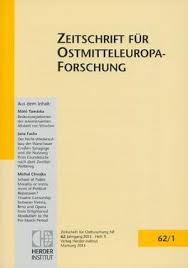Die deutschsprachigen Provinztheater Böhmens und Mährens zwischen lokaler, regionaler und nationaler Identität
The German language provincial theatres of Bohemia and Moravia betwixt local, regional and national identities
Author(s): Katharina WesselySubject(s): Language studies, Theatre, Dance, Performing Arts, Recent History (1900 till today), 19th Century, Politics and Identity, Identity of Collectives
Published by: Verlag Herder-Institut
Keywords: German language; provincial theatres; Bohemia and Moravia; identities;
Summary/Abstract: An identity needs a location, a place in which it can first of all develop, and then manifest itself. One of the particular places in which this was possible for the middle classes from the final third of the 19th until the first half of the 20th century was the municipal theatre. Consequently the main focus of this paper is on the role of the theatre in the processes by which identity was produced, taking the German Theatre in Brünn (Brno) in the period between the world wars as the example. In an introductory section relevant specific features of the “provincial theatre” are examined and explained. In the German speaking areas of Bohemia and Moravia these not only functioned as representative media, but also underlined the sense that the town in question belonged to the German cultural sphere. After a section dealing with the links between theatre and identity, which examines the role of the theatre in the “struggle of nationalities” between the Germans and the Czechs, the text deals with two specific case studies from the history of the Brünn theatre. The first case shows how anti-Semitic theatre scandals were staged in Brünn to provoke a debate over what was to be regarded as “German” and what was to be excluded. The second case poses the question of how far Czech-German co-operation in festival performances may be seen as evidence for the development of alternative, non-national identities, such as those with a region, or with the Czechoslovak State. As the special theatrical productions in honour of his birthday show, it appears that President T.G. Masaryk in particular represented a symbol which enabled identification with the Czechoslovak State. The text shows that the provincial theatres of Bohemia and Moravia stood at the interface of the various identity debates. Depending on the situation, they presented and dealt with local, regional, and national forms of identity.
Journal: Zeitschrift für Ostmitteleuropa-Forschung
- Issue Year: 59/2010
- Issue No: 2
- Page Range: 208-226
- Page Count: 19
- Language: German

